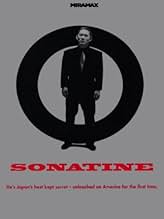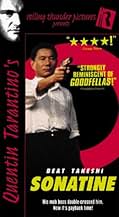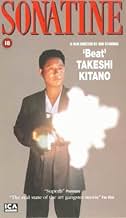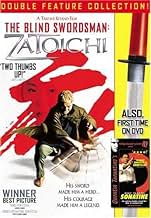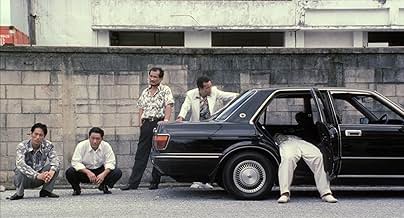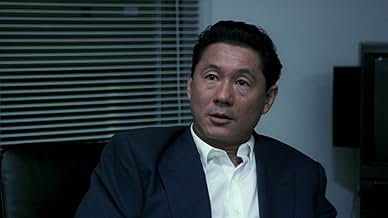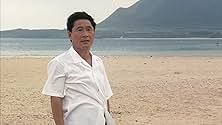Diversi yakuza di Tokyo vengono inviati a Okinawa per aiutare a porre fine a una guerra tra bande. La guerra poi si intensifica e gli sbandati di Tokyo decidono di sdraiarsi sulla spiaggia.Diversi yakuza di Tokyo vengono inviati a Okinawa per aiutare a porre fine a una guerra tra bande. La guerra poi si intensifica e gli sbandati di Tokyo decidono di sdraiarsi sulla spiaggia.Diversi yakuza di Tokyo vengono inviati a Okinawa per aiutare a porre fine a una guerra tra bande. La guerra poi si intensifica e gli sbandati di Tokyo decidono di sdraiarsi sulla spiaggia.
- Regia
- Sceneggiatura
- Star
- Premi
- 4 vittorie e 1 candidatura in totale
Recensioni in evidenza
In that sense, the internet-famous cover photo of writer/star/director Takeshi Kitano grinning broadly while holding a gun to his head is a precise depiction of the film's themes. These gangland thugs might be all business when they're intimidating store owners or trading bullets with a rival gang (nary an eyelash is batted when Kitano and company dunk a victim for too long and accidentally drown him), but on their down time, they need to cut loose, have a few laughs and make human connections, too. The really interesting points are where those two opposite modes meet, a jolting transformation when light amusement slams into stone-serious reality and all the easy smiles melt. There's always a momentary hesitation where we can't be certain which way the scales will tip, and that's dangerously exciting. Those key moments take time to develop, though, which leads the plot to really sag in the middle.
Kitano performs very well as the central figure, a stark dichotomy of incompatible moods, but he can't be on-screen at all times and isn't always surrounded by the best supporting talent. A strong thematic concept, one which evidently developed live in the field as the script was extremely bare bones, but not especially well-executed. Loaded with promising ideas, much of Sonatine's ephemeral potential depends upon what you, the viewer, are willing to bring to the table.
A masterpiece of minimalism, 'Sonatine,' is a powerful, quiet film that speaks volumes without the need for words. Written and directed by Kitano, the film parodies the conventions of gangster films whilst playing into them, showing how facile and vacuous the majority of them are. The film strikes the perfect balance between introspection and sudden, whirlwind action, containing no unnecessary moments, stylizations or lines of dialogue. It is an economic, intelligently constructed movie that simmers steadily over its' runtime up to a terrific boil of violence, nihilism and existentialist depth.
'Sonatine' is oft compared to the films of Jean-Pierre Melville, in particular 'Le Samouraï.' Indeed, both films adopt a nihilistic attitude towards violence and feature long sequences containing limited dialogue. This allows the audience to experience the film's atmosphere and take themselves into the mind of the characters in a manner unfettered by extraneous noise. However, 'Sonatine' is less emotionally frigid than the work of Melville, and contains much humour; something rarely if ever found in Melville's movies. It is- on the whole- a far more entertaining cinematic experience; not to mention being a more rewarding intellectual one.
The film is shot by Katsumi Yanagishima, who worked on Kitano's previous efforts 'Boiling Point' and 'A Scene at the Sea.' Under Kitano's firm guidance, his cinematography is understated and naturalistic, producing haunting visuals that linger in the mind long after the credits have rolled. Kitano's films rarely if ever feature orthodox composition or framing of images, and the fresh, organic and off-beat approach to visuals in his movies is continuously striking and distinct. Yanagishima would go on to work on Kitano's next thirteen directorial features; though their collaboration on 'Sonatine' may still be their crowning achievement.
'Sonatine' features the work of another frequent collaborator of Kitano's: composer Joe Hisaishi. His score is beautiful, mournful and melodic; drifting through the film like a euphonious wind. There are few partnerships between composer and director as fruitful in cinema, perhaps only that of David Lynch and Angelo Badalamenti comes close. Hisaishi's work is muted and evocative, adding unquestionable power and depth to the proceedings. Hisaishi worked on seven of Kitano's films, and never once was his score anything other than mellifluous, pure and unobtrusive; as it is in 'Sonatine.'
Additionally, the film boasts a commanding central performance from Kitano as Murakawa. Few have a presence on screen as magnetic and quietly confident as Kitano. He performs with an unabashed ease and an unmatched stillness; seeming like a silent Cheshire cat without the grin, noting the proceedings around him with prescience and irony. His Murakawa is a composed man capable of extreme brutality, one tired of his existence and all too used to the grind and violence of life. Kitano fully becomes this character in so subtle a manner some might think he isn't doing anything at all; the highest compliment any actor can be paid.
His supporting cast features many talented performers working at the top of their games, most notably the great Susumu Terajima and the late Ren Ôsugi; both frequent collaborators of Kitano. Here, Terajima stars as Ken, one of Murakawa's underlings, delivering an assured performance of depth and wit. Ôsugi is equally outstanding, playing a smaller role as an associate of Murakawa's named Katagiri; though still impressing with his range and naturalness.
Takeshi Kitano's 'Sonatine' is a brilliant crime film of the ascetic variety that is unforgettable and unique. On every level, the movie impresses, from the excellent performances to Katsumi Yanagishima's striking visuals; and of course the stirring score from Joe Hisaishi. It is- for lack of a better term- the thinking man's crime film, as it contains moments of profundity and silence that would no doubt put many off or leave them clamoring for more action. In short, 'Sonatine' is a memorable, mature masterpiece of minimalism from an original, incomparable auteur. If you haven't seen it before, watch it now; 'Sonatine' is not to be missed.
Lo sapevi?
- QuizThe title Sonatine comes from the musical term sonatina. Kitano said that when learning the piano, when the learner gets to sonatinas they have to decide where they want to go, whether it is to classical, jazz or popular music; marking the point of crucial decision making. This refers to the character Murakawa in the film.
- Citazioni
Miyuki: You're tough. I love tough guys.
Aniki Murakawa: I wouldn't carry a gun if I were tough.
Miyuki: You can shoot without a second thought.
Aniki Murakawa: I shoot fast because I get scared fast.
Miyuki: But you're not afraid of dying, are you?
Aniki Murakawa: When you're scared all the time, you reach a point when you wish you were dead.
- Curiosità sui creditiAt the end of the closing credits, various shots of the beach that were taken a year or so later, are included.
- ConnessioniFeatured in Century of Cinema: Nihon eiga no hyaku nen (1995)
I più visti
- How long is Sonatine?Powered by Alexa
Dettagli
Botteghino
- Lordo Stati Uniti e Canada
- 58.834 USD
- Fine settimana di apertura Stati Uniti e Canada
- 17.527 USD
- 12 apr 1998
- Lordo in tutto il mondo
- 58.834 USD
Contribuisci a questa pagina



